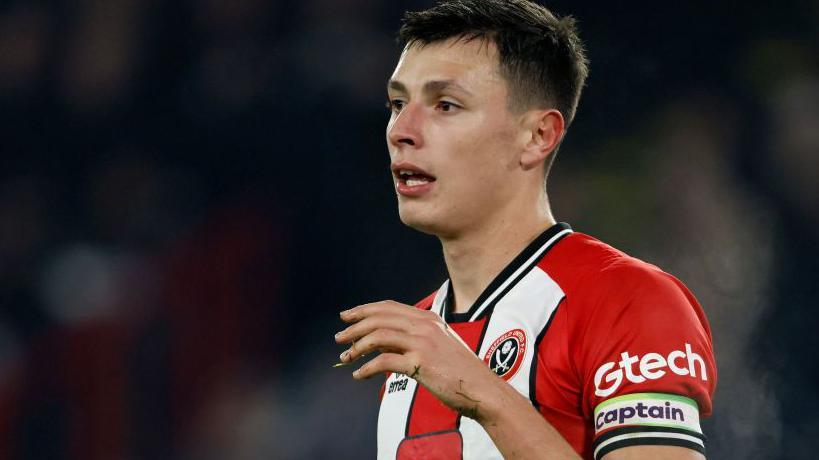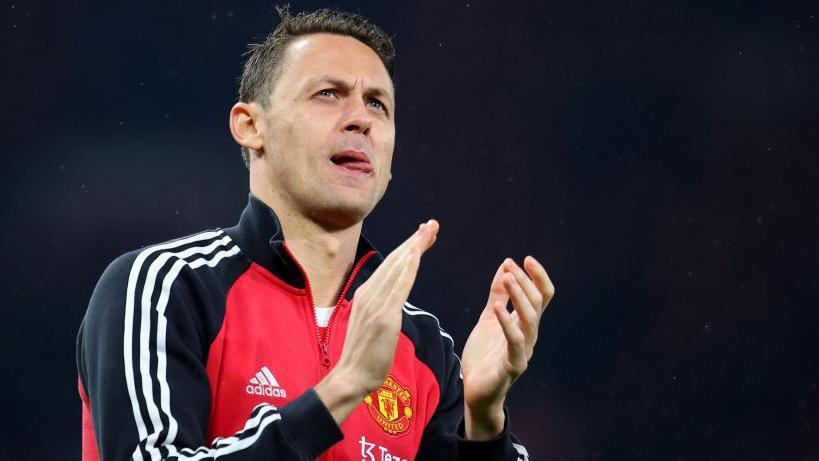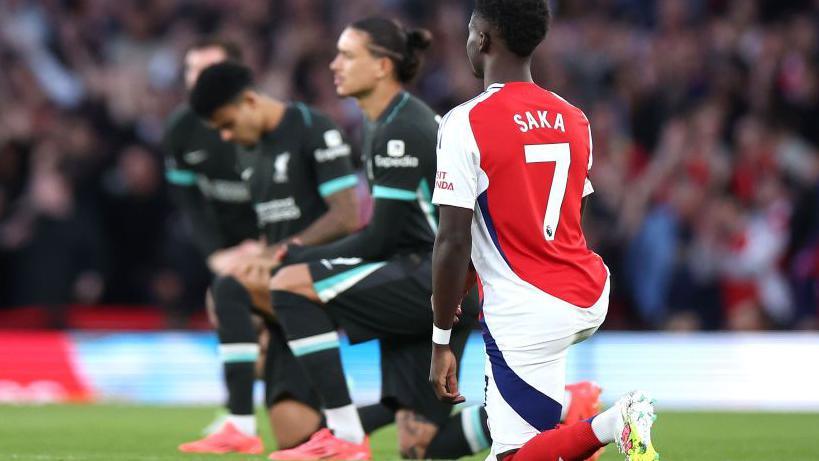Ipswich Town captain Sam Morsy’s decision not to wear the rainbow armband in support of the Premier League’s Rainbow Laces campaign has drawn scrutiny.
Morsy wore a standard-issue armband instead of the rainbow design during his side’s 1-0 defeat by Nottingham Forest on Saturday for “religious beliefs”, according to his club Ipswich.
He did the same for Ipswich’s game against Crystal Palace on Tuesday night.
So what are the factors behind the decision – and what has the reaction been?
What is the Rainbow Laces campaign?
The Premier League collaborates with LGBTQ+ charity Stonewall on the Rainbow Laces campaign every season.
The initiative involves top-flight players being encouraged to wear rainbow-coloured laces and captain’s armbands to demonstrate support for the rights of LGBTQ+ people, inspire acceptance among children and young people, and promote equality and diversity.
Rainbow Laces was first launched in 2013, typically lasts for a week and has been supported by all clubs and the vast majority of Premier League captains since.
Why did Morsy not wear the armband?
Morsy has chosen not to comment on his decision so far.
It is not compulsory for captains to wear the armbands, which are provided by the Premier League, along with other matchday assets.
But Ipswich Town said in a statement on Monday that the 33-year-old Egypt international, who is a Muslim, made the choice based on his religious beliefs.
“We proudly support the Premier League’s Rainbow Laces campaign and stand with the LGBTQ+ community in promoting equality and acceptance,” the club said.
“At the same time, we respect the decision of our captain Sam Morsy, who has chosen not to wear the rainbow captain’s armband due to his religious beliefs.”
![Morsy shakes hands with Guehi, who wrote 'Jesus [heart] you' on his armband](https://ichef.bbci.co.uk/ace/standard/820/cpsprodpb/eaec/live/5afdf280-b1af-11ef-9395-615813d4ff0f.jpg)
With the Rainbow Laces campaign falling on a week with midweek Premier League fixtures, Morsy again chose not to wear the rainbow armband for Ipswich v Crystal Palace on Tuesday, while Palace captain Marc Guehi (right) wrote ‘Jesus [heart] you’ on his armband
What has the reaction been?
Morsy’s decision, which made him the only captain to not wear the armband in last weekend’s round of fixtures, has garnered support from some and criticism from others.
Ipswich Town LGBTQ+ supporters’ group Rainbow Tractors told BBC Radio Suffolk: “While Rainbow Tractors were aware in advance of the decision, we are disappointed that Sam Morsy chose not to wear the rainbow armband in support of the Rainbow Laces campaign.
“We do, however, continue to respect his religious beliefs as we have done in previous seasons.”
The fact that Morsy’s religious beliefs have been cited as the reason behind his decision has led to confusion and accusations of hypocrisy from some, given the Wolverhampton-born midfielder has previously worn shirts promoting gambling sponsors. Gambling is forbidden according to Islamic law.
Uefa executive committee member Laura McAllister, a former captain of Wales who was told to remove a rainbow-coloured hat at the 2022 World Cup in Qatar, said on BBC Radio 5 Live: “I think there has to be an element of individual choice, but I’m really disappointed because a captain represents the team, and the club, and everybody who is a fan of that club, and everybody who works at that club, and that will include a lot of LGBT people as well.”
Have there been other similar situations?
![Crystal Palace captain Marc Guehi wrote 'I [heart] Jesus' on his captain's armband at the weekend](https://ichef.bbci.co.uk/ace/standard/820/cpsprodpb/d00c/live/1e997210-b1be-11ef-8613-eb846c2a010c.jpg)
Crystal Palace captain Marc Guehi put his own message on the captain’s armband at the weekend
Crystal Palace captain Marc Guehi wore the armband in his team’s draw with Newcastle last weekend, but wrote ‘I [heart] Jesus’ across it.
The Football Association (FA) chose not to take action against Guehi, but is to remind both the club and player that religious messaging on their kit is banned.
In Tuesday’s game with Ipswich, Guehi changed his written message to ‘Jesus [heart] you’.
Morsy is not the first footballer to choose not to participate in a campaign designed to show support to LGBTQ+ people.
Sheffield United defender Anel Ahmedhodzic, also a Muslim, did not wear the armband when he was made Blades captain during their Premier League defeat by Liverpool last season.
Like Morsy, he also declined to provide an explanation for his decision, simply replying “guess” when asked to clarify in an interview with Swedish broadcaster SVT Sport.

Anel Ahmedhodzic also chose not to wear the rainbow armband
Previously, clubs in France’s top two divisions wore rainbow-themed shirts for one matchday per season in order to demonstrate support for International Day Against Homophobia, Transphobia and Biphobia.
The names and numbers on the back of shirts were rainbow-coloured, meaning every player in the division was automatically involved in the initiative.
But a minority of players did not want to participate in the campaign and refused to wear the shirts. That led to some players making themselves unavailable to play and being left out of matchday squads by their clubs.
Current Everton midfielder Idrissa Gueye was left out of Paris St-Germain’s squad for two consecutive seasons because of his apparent refusal to wear the amended kit, while five players on the books of Toulouse and Nantes missed their respective clubs’ matches in 2023.
The Ligue de Football Professionnel, which runs Ligue 1 and Ligue 2, announced earlier this year that it was ending the campaign following the controversy.
The president of a French LGBTQ+ charity told newspaper L’Equipe: “We are shocked by the way in which the symbol of the LGBT+ fight against homophobia will be made invisible.”
What about other campaigns?

In 2018, Nemanja Matic declined to wear a poppy on his Manchester United kit, saying it reminded him of when his Serbian village was bombed by a Nato-led offensive when he was 12
The Premier League has committed to a variety of initiatives designed to show support for different causes in recent years.
Following the murder of US citizen George Floyd by a police officer in 2020, Premier League footballers began taking the knee before kick-off to show support for the Black Lives Matter movement, external, following in the footsteps of NFL player Colin Kaepernick.
Over time the campaign has been changed and become less specific. Players now take the knee before only four fixtures per season, and the Premier League says the gesture is designed to “demonstrate their ongoing commitment to fight racism and all forms of discrimination”.
Clubs in the Premier League and English Football League have worn poppies, which are commonly worn in the UK to commemorate the service of members of the British Armed Forces, on the front of their shirts in the run-up to Remembrance Sunday for around 15 years.
But some, including Republic of Ireland winger James McClean and Serbia midfielder Nemanja Matic, have chosen not to do so because of British involvement in military conflicts in their home regions.
How do major religions approach LGBTQ+ issues?
There is variation among clerics on the relationship between Islam and homosexuality. Some interpretations of Islam are more conservative, while some are more liberal.
In many modern Muslim countries there are restrictions on homosexual relationships. In Egypt, homosexuality is not criminalised, but was described as “highly stigmatised” by a 2023 BBC News investigation.
Different interpretations of religious texts in other major religions such as Christianity and Judaism means followers can have varying views about homosexuality.
A person’s religion does not inherently define their view of LGBTQ+, and not all followers of any one religion believe exactly the same things.
Many religious people also identify as LGBTQ+.
Diego Garcia Rodriguez, research fellow at the University of Nottingham and author of Gender, Sexuality and Islam in Contemporary Indonesia: Queer Muslims and their Allies, told the BBC that clubs and players can help forge an increased understanding between football and religion.
“What we have traditionally witnessed is the dominance of conservative interpretations of the Qu’ran,” he said. “But if you look at the work of progressive Islamic scholars too, there is an emphasis on justice, on compassion. There are many Islamic verses that ask Muslims to stand for justice. These values have also been used to challenge discrimination.
“Football has that ability to bring people together and unite them across differences. Football clubs and players have the opportunity to lead by example and to emphasise that inclusivity can strengthen the game.”
Earlier this year BBC News reported on the UK’s first Muslim Pride event.
One of the Muslim Pride attendees, Farhan, told the BBC it is important to challenge the notion that Islam is “inherently queer-phobic”.
“This is an assumption that’s not necessarily based on fact, because if you read the parts of the Qu’ran that supposedly condemn homosexuality, it’s not as clear-cut,” Farhan said.
A report released earlier this year by ILGA-Europe – an independent group of hundreds of LGBTQ+ organisations from across Europe and Central Asia – suggested that LGBTQ+ rights are regressing in the UK.
It ranks the UK just 15th for support for LGBTQ+ rights among 49 European countries, external, having ranked first in 2015.
Why might some players not support some campaigns?

Premier League players have been taking the knee to oppose discrimination for more than four years
Writing on social media platform X, external, FA consultant Liz Ward explained why some players might struggle to understand the purpose of their involvement.
“When people feel as though they are being ‘told’ to do something, as opposed to really understanding ‘why’ they’re doing something, conflict will arise,” Ward explained.
“When you then bring into question values and beliefs, the conflict becomes severe, wide reaching and impossible to combat. This is true of any workplace, no less professional football.
“Players aren’t having regular conversations about race, gender, sexuality or any other protected characteristic. Clubs, with the best intentions, often tell players what campaign they will take part in.
“[Players] are being told to wear laces, an armband or a warm-up top because they ‘have to’. I’ve seen players be told that it’s part of their contract, threatened with a breach if they don’t take part.
“We need better communication and player involvement in campaigns such as this.”
Players are able to access support from the Professional Footballers Association (PFA) – the footballers’ union for England and Wales – on matters concerning identity, faith and spirituality.














Leave a comment